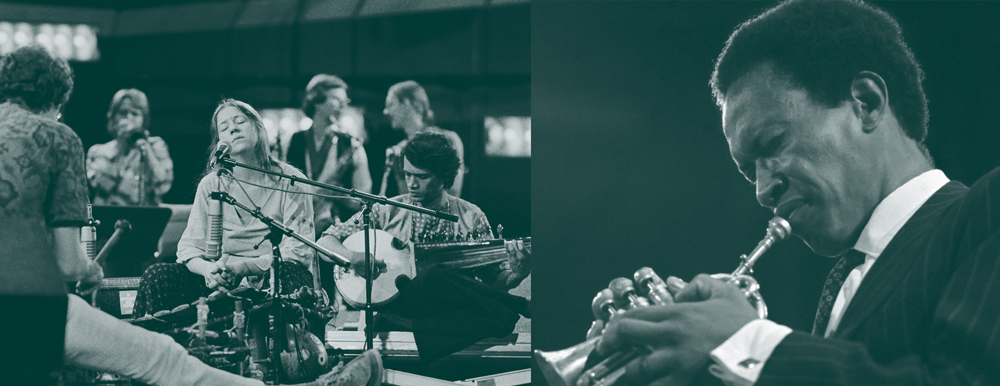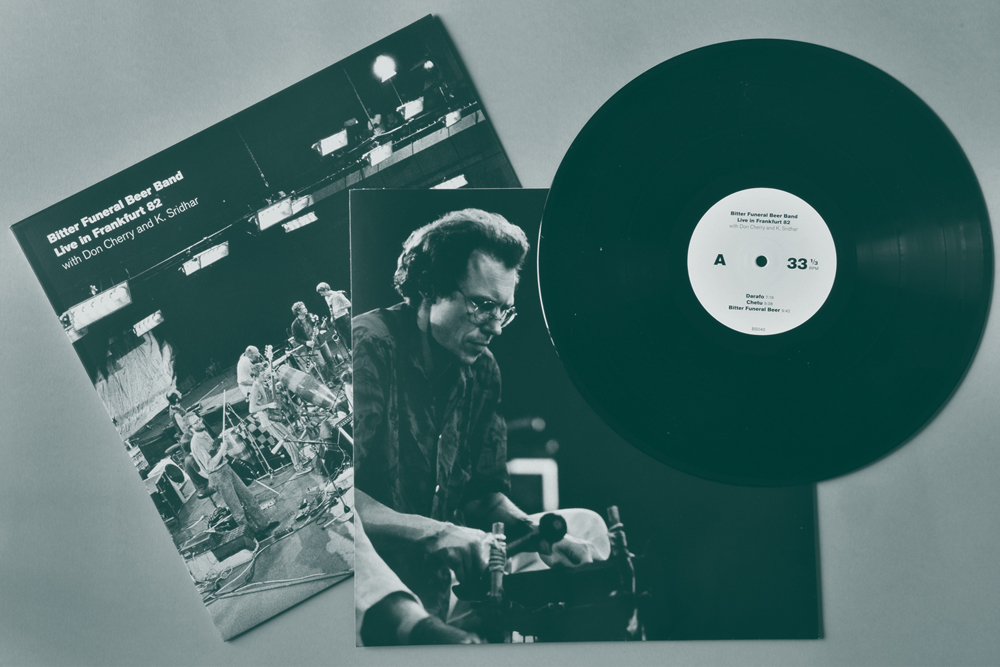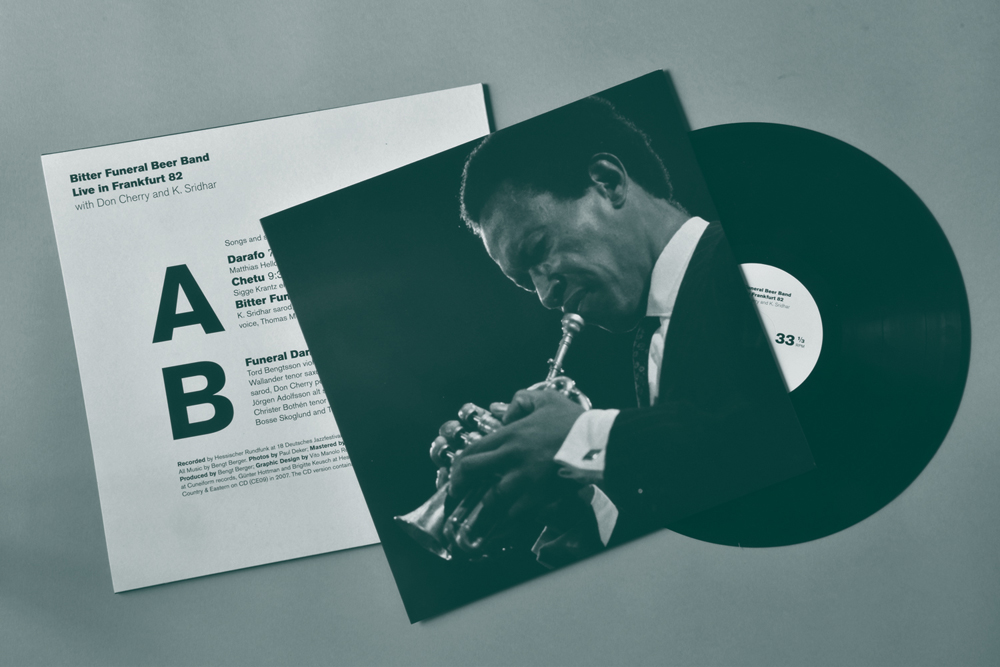CLICK HERE TO PURCHASE LIVE IN FRANKFURT 82All photos by Paul Deker.Don Cherry‘s connection to Sweden’s music scene was almost two decades old by the time he joined with Bengt Berger‘s Bitter Funeral Beer Band to play this Frankfurt festival gig in 1982.
The details on his first Swedish session are vague, but Don made it to Europe at least twice in 1963. On January 17, his quartet with Sonny Rollins (with Henry Grimes and Billy Higgins) played a concert in Stockholm broadcast by Swedish Radio. It was during this trip that Don met his future wife, the textile artist Monika “Moki” Marianne Karlsson, at the Golden Circle jazz club. He was back in Stockholm in November with the New York Contemporary Five (replacing Bill Dixon who was having trouble with his embouchure). Somewhere in there, Don recorded a trio session with saxophonist Bengt “Frippe” Nordstrom and drummer Bosse Skoglund (already a veteran of Lars Gullin and Staffan Abeleen‘s bands). The untitled tracks were released (at least as a part of) the Psychology LP on Nordstrom’s Bird Notes label (following Nordstrom’s two LPs with Albert Ayler). At least six copies are known to have been pressed, but Psychology has no competition as the rarest European jazz LP.
Returning to the U.S., Don joined Albert Ayler’s band in 1964 to record New York Eye and Ear Control (the soundtrack for a Michael Snow film) then went with that group to play shows and record in Europe. Following this he went to Paris, where he began his first international unit in 1965, the expanded version of which cut his classic Blue Note debut, Symphony for Improvisers. After this juncture, Cherry would spend much more time abroad than in the U.S. and his musical focus shifted from jazz-qua-jazz to something much larger.
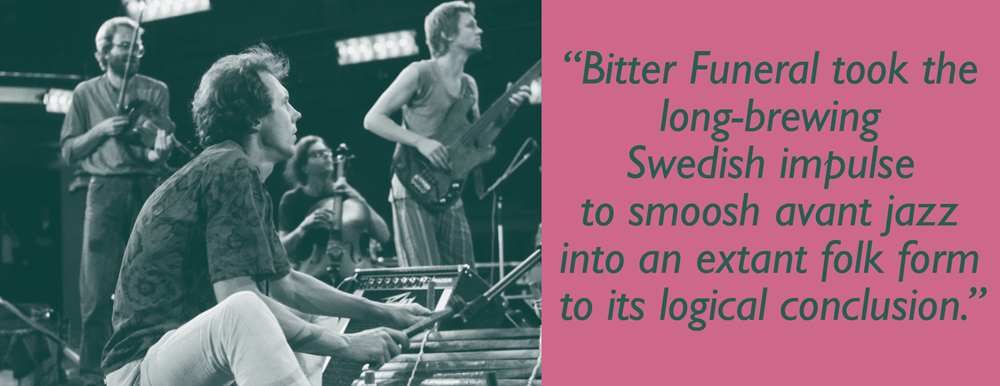
By 1967, Cherry had “settled” in Sweden. He and Moki got married, and he played regularly with Nordstrom and other Swedish musicians. This seems to be the period during which Don began seriously studying instruments with stronger ties to folk music. The first publicly issued example of this was the amazing Eternal Rhythm LP, waxed at the Berlin Jazz Festival in November, 1968. While the record remains jazzoid on the whole, it also brings in vast chunks of other culture’s musical languages, and is an album as groundbreaking as it is mind-blowing. More recent archival finds have filled in a bit of the backstory. Recorded at a workshop in July 1967, the Movement Incorporated CD lets us hear Don leading a workshop band, including Bernt Rosengren, as well as the ex-pat Turkish trumpeter Maffy Falay (who would soon find the exquisite Sevda), as well as Okay Temiz (the Turkish drummer who would join Maffy in Sevda, then form Oriental Wind). In September 1968, Cherry led a smaller version of this band (without Temiz) for a session that was released as half of Caprice’s Don Cherry Live in Stockholm set. Both of these recordings provide glimpses of the process involved in integrating free improvisation and music from non-Western sources. It’s obvious the concept is still a work-in-progress, but the results are still mesmerizing. A more fleshed-out (if low key) version of these possibilities appears on Live in Ankara, which was recorded in November 1969 with Don fronting an all-Turkish outfit.
Also in 1969, Don met the Swedish drummer, Bengt Berger, who had played alongside Thomas Mera Gartz with Pärson Sound at their first Swedish Radio session in 1967. Even by ‘67 Berger, who’d begun with the idea of being a jazz drummer, had already visited India twice to study various instruments. Soon after the Pärson Sound session he returned to India, coming back to Sweden in ‘69, where he joined the band, Arbete och Fritid (“Work & Play”) with cellist Ove Karlssom. saxophonist Roland Keijser (who’d been in Gunder Hägg with Urban Yman from Harvester), saxophonist Kjell Westling (also from Harvester), and trumpeter Torsten Eckerman (who’d been in the legendary G.L. Unit following his own stint in Gunder Hägg). Arbete och Fritid were an important band in Swedish underground history for the ease with which they blended rock, jazz, Swedish traditional material and Eastern flavors. They lasted for over a decade, and made a bunch of cool records, but Berger and Westling split after the first two studio albums.
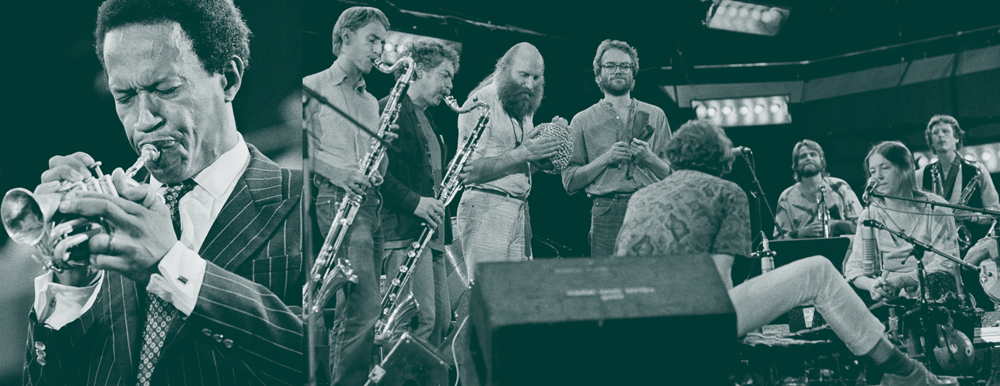
In 1970, Moki and Don had bought an old schoolhouse in the rural town of Tågarp in southern Sweden. Don would sit in with Arbete och Fritid when he was able, and Berger hung out at the Tågarp house regularly. And while Bengt did not participate in the original configuration of the Organic Society ensemble (whose 1971 performance at the Museum of Modern Art is the second half of the Live in Stockholm 2LP set), he plays on much of the freaked-out Organic Music Society double-album, which is somewhat out-of-focus at times, but remains a monster of destroyed form. Also present at those sessions was Christian Bothén, who plays piano and African instruments. Bothén and Berger comprised most of the band on Cherry’s next album, Eternal Now, which also brims with fully spaced-out multi-cultural stonerism of very high order.
Soon after this, Berger and Bothén formed a group called Spjärnsvallet with saxophonist Westling (from Arbete) and bassist Nikke Ström, who’d been in Nynningen. The quartet was quite explicit in the way they combined African music and avant jazz, and their sole album (which has been reissued in expanded form) is a minor classic. When Spjärnsvallet folded, Berger joined another new band working in the same vein. Archimedes Badkar included the music of even more cultures into their mix and dropped some of the jazz focus to create a sound that was closer to free-rock with lots of folk underpinning. Bothén was also involved in the band at times, and all of their records are worth hearing for the crazy mix of sounds they came up with (which prefigure “world music,” although the band destroys that fairly-lame term with their explosive freak-force).
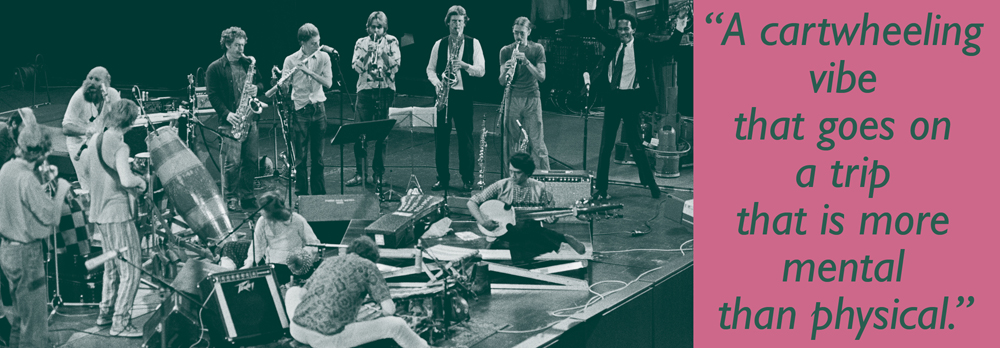
After returning from another visit to Ghana, where he pursued further studies with the ko-gyil (a funeral xylophone he had first played “out” on the final Archimedes LP), Berger was offered a record deal with ECM. He put together a band made up of old mates Bothén, Westling, Gartz, Bosse Skoglund (from that first Bird Notes session), Tord Bengtsson (from Arbete och Fritid), Jörgen Adolfsson, Sigge Krantz and Tommy Adolfsson (from Archimedes Badkar), cellist Mattias Helldén, saxophonist Ulf Wallander, and string wrangler Anita Livstrand, with Big Daddy (Don Cherry) sitting in. The resulting album, Bitter Funeral Beer Band, was generally hailed as one of the best records of 1982 by anyone who heard it. Based on the music played by bands at Ghanian funerals (which sounds conceptually parallel to New Orleans’ second-line bands), Bitter Funeral took the long-brewing Swedish impulse to smoosh avant jazz into an extant folk form to its logical conclusion. To my ear, the record remains the apex of the genre. It’s a scorcher.
Bitter Funeral Beer Band with Don Cherry & K. Sridhar Live in Frankfurt ‘82 documents a show by the same line-up, with added sarod by Krishnamurti Sridhar, and a cartwheeling vibe that goes on a trip that is more mental than physical. Built around a sequence of basic pulses, the four tracks here (an earlier CD had one more tune) careen off in all kinds of unexpected directions, while maintaining a strong central core. The sarod definitely adds a nice edge to the proceedings, but the basic approach is similar to the classic studio LP. The instruments band together the way they do with a lot of the big African jazz bands you’ve heard, and individual players dance around the edges. It’s a perfect vehicle for Cherry, and pretty much everyone to take turns doing “solos,” that actually power themselves back into the center of things.
The sound is as fat as a tick on Donald Drumpf's ass, but was probably a lot more fun to watch.
— Byron Coley, July 2018
